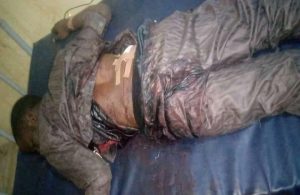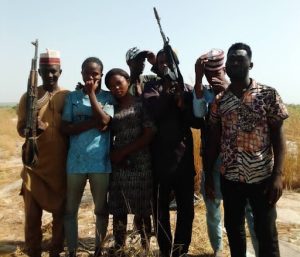By Shereefdeen Ahmad

On a scorching Friday, the 17th of February in 2023, the sun cast its fiery embrace upon the earth, as the campus of Usmanu Danfodiyo University in Sokoto bustled with an atmosphere familiar to the end of an academic semester. Students, burdened with their luggage, wove through the pathways, a blend of anticipation and exhaustion marking their faces.
Among them was Aminu Muntari, a third-year student studying Education Chemistry. Despite finishing his exams a week prior, he remained on campus due to a cashless policy that had gripped the country, leaving many stranded. Aminu’s excitement was palpable, as he envisioned reuniting with his family in Kaduna, in Nigeria’s Northwest.
After enduring long and laborious queues in front of Automated Teller Machines(ATMs), Aminu Muntari struggled to secure some cash to set off on his journey to Kaduna that Friday.
Sitting in the bus, enveloped in his thoughts, musing, praying and chatting with other passengers, Aminu’s reverie was interrupted when the landscape shifted dramatically. Armed men, bristling with weapons, materialised on the horizon as the driver neared Tsafe—a town in Kaduna State.
Aminu, sat at the front seat of the bus beside the driver. At first, he and the driver mistook them for security personnel. A checkpoint nearby lent credence to this illusion. But terror erupted as the truth unveiled itself— these were not guardians of the law; they were bandits.
“But before we knew it, we realised that they’re bandits and they started raining bullets on our bus,” Aminu recalled. “Our driver managed to drive through them but I realised that one of the bullets hit me.”
In the aftermath, Aminu found himself at Tsafe General Hospital, treated for a bullet wound that struck his lumbar vertebrae. Miraculously, surgery was deemed unnecessary. His road to recovery was arduous, marked by hospital transfers and a persistent reliance on a gait belt for mobility.
At the Katsina Orthopaedic Specialist Hospital, the doctors confirmed that the bullet hit his lumbar vertebrae— the vertebrae between the rib cage and pelvis in the human body. Following a careful medical examination, he was fortunate to escape surgery, which, according to the doctors, could have cost N1.5 million.
Bedridden for about two months, he became relatively hale. But the incident almost turned him into a handicap, as he now walks with the support of a gait belt. The ordeal exacted a toll on Aminu’s academic journey. “Where once I walked to lectures in 20 minutes, it now takes nearly 40, leaving me exhausted,” he lamented. His injury rendered him unable to sit for extended periods, hampering his ability to study. “I miss classes and the pain distracts me even when I try to focus,” he added.

Aminu’s experience is emblematic of a larger crisis that has engulfed Nigeria. Insecurity, particularly in the Northwest, has escalated to unprecedented levels, impacting all aspects of society, including education. The data is chilling – over the past eight years, more than 63,000 lives have been lost due to terrorism, banditry, and clashes.
The data shows that in 2021 alone, Nigeria recorded a total of 8372 fatalities across the country. A breakdown of these fatalities according to the geopolitical regions shows that the North West suffered the highest with 3051 deaths, followed by the North-East with 1895 casualties, North-Central 1684 victims, South-East 853, South-South 448 and South-West 441.
No less than 60,000 people have been killed in Nigeria’s 18 Northern states in the last 10 years due to insecurity, a report by the Centre for Democracy and Development(CDD) noted.
The scary data has rated the West African country the third worst country with insecurity in the world in 2020, according to the Global Terrorism Index (GTI). Even though there seems to be a little respite in 2022 and 2023 as GTI placed Nigeria on six and eight positions respectively.
The Wake of Kidnappers
In 2021, Konda Immaculate was kidnapped. The 300-level student of the Accounting department at Usmanu Danfodiyo University, Sokoto met with this fate when she set out on her journey to Sokoto, Northwest Nigeria, to resume her undergraduate programme on Tuesday, 19th October 2021.
She boarded a bus at the Benue Links motor park in her home town of Benue State, North-central Nigeria. But after Funtua —a town in Katsina State—a gang of terrorists attacked their bus and took them to a scary bush together with other passengers.
Narrating her ordeal, Immaculate said,”they didn’t beat us. They tied our legs and kept us in one position for the whole day.”
After seven days of captivity, Immaculate and the other passengers regained freedom following the payment of N9 million ransom.
Immaculate suffered a mental breakdown after the incident, as the thought of the scene with the bandits haunted her, taking a huge toll on her mental well-being.

“It was very hard on me at first but with the support of everyone around me, I was able to get over it,” she said.
“I went through traumatic moments at that time, and sometimes, I used to lose concentration in lectures after getting a mental flash of the incident and how it was tough.”
Victims of such unfortunate incident, just like Immaculate, suffer a form of mental illness called ‘post traumatic stress disorder,’ according to Isi Richard-Koko, a mental health counsellor at New Life Mental Health Relief and Care Initiative, a non-governmental organisation aimed at supporting men, women, and children with mental health problems in Nigeria.
“It is a very serious mental health disorder which can affect their sleep and daily activities.”
“Traumatic events like watching a loved one killed, an accident and any really bad experience can result in the problem.”
Richard-Koko added that, “They need to see a therapist/counsellor who will assess them because every case is different.”
In March 2022, a student of Bayero University, Kano, who does not want name mentioned for fear victimisation, also went through a similar fate as Immaculate.
“In Kaduna, they [the kidnappers] broke into our house in the middle of the night and abducted me. About N5 million was paid as ransom for my release.”
“After the incident, I thought I was okay until I returned to school where I almost went crazy.”
“Because I will be in class and my mind would just go out to the pictures of the incident. I would forget myself totally.”
“I tended not to do well with my studies due to the fact that I couldn’t remember some of the things I was taught in the class.”
It is worrisome that seven years after the abduction of 276 girls of Government Girls Secondary School, Chibok, Borno State, North-Eastern Nigeria, which attracted global outrage, things have taken a more dangerous dimension as attacks on schools and students have now become the order of the day.
Reports show that about 800 students, including those attending higher institutions, have been abducted in coordinated attacks on schools in mostly northern states in the last six months of 2021.
And about N653.7 million has been paid as ransom in Nigeria between July 2021 and June 2022, a period of one year, for the release of kidnap victims, according to SBM Intelligence, a Lagos-based security and political risk research firm.
The report said at least 500 incidents of kidnapping were recorded and 3,420 people were abducted across Nigeria, with 564 others killed in abduction-related violence in the same period.
The security report also recorded that N6.531 billion was demanded in ransom in the year but N653.7 million was paid as ransom for the release of captives.
Meanwhile, between July 2022 and June 2023, 3,620 people were abducted in 582 kidnap-related incidents in the country, with a reported ransom demand of at least N5 billion and actual ransom payments of N302 million. However, this figure could be higher due to underreporting.
“Insecurity has collapsed the whole Nigeria, and virtually every sector is affected, including education,” the National Secretary, Retired Members of Nigeria Armed Forces, Ambassador) Oamien Roy Okhidievbie said.
“Academics are supposed to be enshrined in a system where there’s security. But that is not attainable in Nigeria anymore.”
I Missed Examination, Continuous Assessment While in Kidnappers’ Den
After a joyful Eid al-Adha, an Islamic festival, with his family, Tasiu Umar decided to return to the campus to commence his 300-level examination.
It was on 25th July, 2021. Umar, together with his sister, boarded a bus from Dangulbi, a village in Maru Local Government Area of Zamfara State, to Sokoto.
The thought of how to overcome the examination questions at the Faculty of Law in Usmanu Danfodiyo University, Sokoto, already assembled in his mind as he sat in the bus with other passengers.
But little did he know that he would be spending the next eight days in the kidnappers’ den.
“When we reached a place called Maikasa before Gusau, the state capital, we met a horde of bandits and they started shooting at our car.”
“Our driver stopped and ran away. So, everyone also ran into the nearby bush.”
Unfortunately, Umar and his sister were not as lucky as the driver and other passengers who managed to escape.
“While we were running, they followed us and warned that if we moved, they would shoot at us. So, we had to stop.”
Umar said the bandits tore their shirts to blindfold them and took them to an unknown bush.

They paid N400,000 as ransom after spending eight days in captivity.
“After I came back to school, I missed the General Studies(GST) examination and some of my continuous assessments in my department.”
“In my department, the lecturers gave me makeup C.A, but for the GST examination, I had to carry it over.”
Give us a Selfie: The Fire Power Bandits in Northwestern Nigeria
In Northwest Nigeria, “bandits” is an umbrella term for armed local gangs that rustle cattle, kidnap, loot, and extort villages.
“Northwestern Nigeria is suffering from an intense, destabilising conflict that has flown under the radar of international policymakers and analysts,” said James Barnett, a Nigeria-based researcher and Murtala Rufai, a professor of history, in their commentary published in War on Rock.
Bandits such as Konda Immaculate’s abductors have grown brazen to the level of displaying their identity to the world.
“The bandits asked us to take pictures with them,” Immaculate said. “They said we can share the photos to the world to show how bad Zamfara State is.”

This brazen attitude by the terrorists is a reflection of the state of insecurity in Northwest Nigeria. According to James Bennett and Murtala Rufai, the bandits “have developed surprising fighting capacity,” giving instances of the Nigerian Air Force’s Alpha Jet gunned down by them on June 18 and the attack on the Nigerian Defense Academy in Kaduna, leading to the murder of two officers and abduction of a senior officer in August 2021.
Banditry has created a mess in the Northwestern part of the country, Barnett and Rufai’s joint commentary noted.
“But with a well-coordinated effort between the federal and state governments, attempts to disarm and demobilise the groups of terrorists ravaging the region can yield positive results.”
“Efforts to address the underlying drivers of insecurity will have to start small, and they will require uncomfortable trade-offs…At such a precarious moment, Nigeria cannot afford to continue down this path,” Barnett and Rufai noted.
They both argued that the government must take decisive actions.
Ineffectiveness of the Law: The Fuel of Nigerian Insecurity — Expert
While speaking with the National Secretary, Retired Members of Nigeria Armed Forces, Okhidievbie noted that the ineffective application of the law in Nigeria has fuelled the harrowing insecurity in the country.
“Insecurity is the collapse of security in society. And if we want to look at measures to take us into a balanced society like other countries are, the fastest and strictest measure is to apply punitive measures.”
“Right now, the laws that we have in Nigeria are no longer effective in terms of application, unlike before.”
To show the gap between then and now, he reminiscenced on his youth days.”Then, I used to go and watch when soldiers were at the firing squad. And that was one reason why I joined the Nigerian army, because I saw it as the apex of discipline.”

“Once we have a law that takes its course, when a crime is committed and the criminal is apprehended, he should be tried accordingly.”
“Now, the army is saying that bandits should expect execution, so what happened before?”
“We always look for alternatives to everything in Nigeria. Until the judiciary and the armed forces become effective, the insecurity would continue to surge.”
While speaking at a webinar organised by ‘Background Check International (BCI) themed ‘Curbing Insecurity in Nigeria: The role of Background Check’, former director, Defence Information, retired Major-General Chris Olukolade, and some security experts provided insights on to tackle the worsening insecurity bedevilling the progress of the country.
The Managing Director of Background Check International(BCI), Kola Olugbodi said that proper checks should be conducted on individuals as the first line of security to address the menace. He advised Nigerians to appreciate the role played by background check in curbing insecurity and violent crimes in the country.
